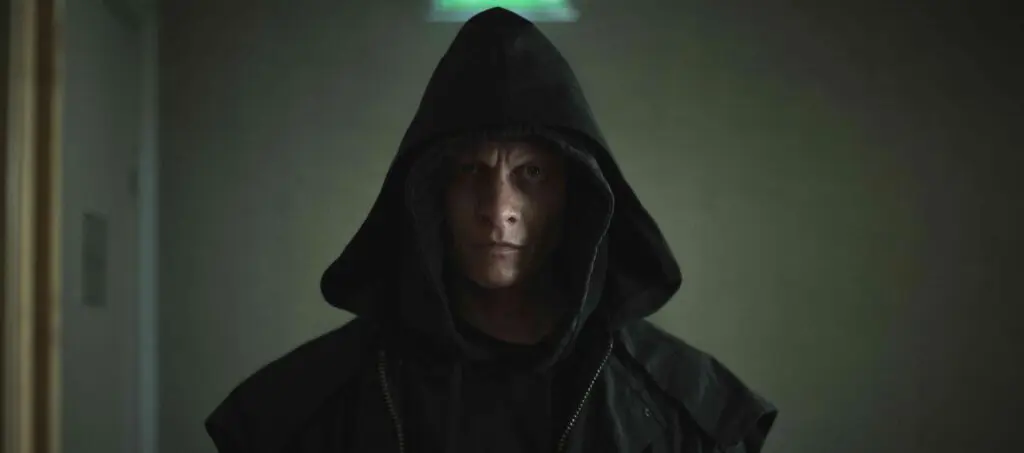Summary
Gone for Good ends with too many twists and a severe lack of earnestness, twisting a final nail in the coffin for several characters.
This recap of the Netflix series Gone for Good episode 5, “Fred” — the ending explained — contains spoilers.
Titled “Fred,” the Gone for Good finale focuses on the brother that started this all. Flashing back to 1995 when Fred (Nicolas Duvauchelle) and Guilaume (Finnegan Oldfield) were kids, the episode chronicles the life of the older brother, from tennis star to abused teen to drug kingpin to man on the run.
Gone for Good episode 5 recap
After choking in a tennis match, young Fred covers for his little brother, being hit by their abusive and controlling father while Guillaume hides from the violence. Teenage Fred then learns that his friend Ostertag has been bullied by a kid from school, entrapping him with Kesler and proceeding to accidentally kill the boy with a rock to the head. Then Kesler’s dad and Fred’s dad teamed up to blame young Ostertag for the whole thing, putting him into a juvenile detention center and later, a prison.
An older, jacked, more tattooed Ostertag (Tómas Lemarquis) emerges from prison to immediately kill his father, becoming involved with Fred and Kesler’s (Grégoire Colin) drug business. The three build a small enterprise that begins to grow, involving Sonia (Garance Marillier) as a drug mule after they see her in Barcelona as a bartender.
Outside of the general plot advancements through these flashbacks, the finale of Netflix’s Harlan Coben adaptation doesn’t offer much. It’s a service to wrap up all of these storylines. The show becomes much more about skewed childhoods, parental abuse, and the need for control for young men. Without the groundwork for these larger themes, as the first four episodes play much closer to straight-laced mystery, they lack the luster to resonate.
Guillaume and Fred wait for their time to find Nora, whose phone they tracked. They find her in Kesler’s lot locked inside a luxury car, killing him in the process. Ostertag comes out and drops a bomb on the brothers’ relationship: Fred killed Sonia 10 years prior. Ostertag, in love with her, ran to avenge her death, shooting Fred, though he got away after swimming from the scene. Fred’s the bad guy. Ostertag’s still not the best guy. Guillaume, still being the only good guy (besides Daco) in this web, kills his own brother when he turns the gun on Ostertag.
Guillaume, portrayed as a lamb throughout the series, delivers the final blow to his own brother, the man he desperately wanted to find. In a sense, justice was served to Fred, and his brother avenges the death of his ex-girlfriend and the horrible consequences of the last decade. Without Fred, though, Nora wouldn’t be alive, and so Guillaume’s love could not exist without his murderous brother’s actions. Still, he pulls the trigger without much hesitation, seeming out of character and out of sound mind.
The ending
The series ends with a scene on a beach, with Guillaume meeting his niece, Alice, along with cementing his relationship with Nora. It’s over-the-top and absurd. It ends the series on a fabricated moment of hope mixed with grief. There’s a falseness to all of it, and maybe that’s the point, that these people will likely never recover from all of these deaths, lies, and decades-long violence. For Alice, it feels like she lost everything, with both of her parents gone and only a tiny clue as to the actions that brought them to those deadly moments. Guillaume and Nora, just like him and Inès, are once again bonded by grief and trauma.
Highs:
- Somehow, Guillaume and Nora ended up together. I call that a win.
- Boat parties still look real fun.
- In Barcelona, Judith takes over for Sonia so that she can party with Fred and his friends. Can you do that at a bar? Just have a random person fill in for you?
- Secret hideouts in old mansions.
Lows:
- So many luxury cars were destroyed in that garage.
- Brotherly love did not last.
- The innocence of childhood really took a hit when the boys accidentally killed someone.
Ramblings:
- Why is there always static on the TV, especially in hotel rooms, when someone disappears/is kidnapped? Has anyone ever seen static on a hotel TV? Do kidnappers change the TV input so that it’s static for dramatic effect?
- Once more I ask, tattoos in prison?
What did you think of the Netflix series Gone for Good episode 5 and the ending? Comment below.




